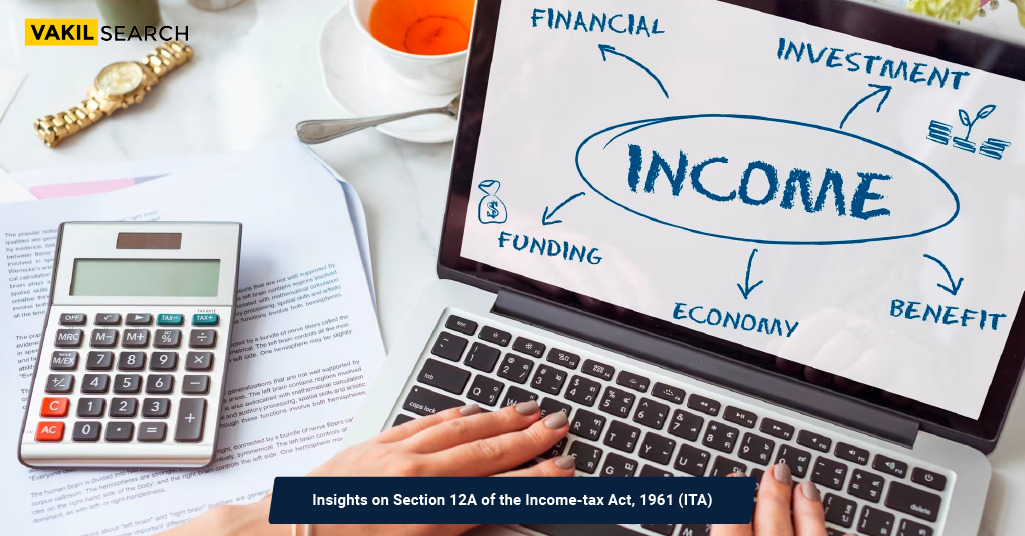Discover tax benefits under Section 12A ITA. Learn about its amendments and how Vakilsearch aids in smooth registration for exemptions.
Overview:
Charitable trusts, non-profit organisations/non-government organisations (NPOs/NGOs), welfare societies, religious institutions, and Section 8 companies play a crucial role in society by undertaking various welfare and charitable activities. To encourage and support these endeavours, the Income-tax Act, 1961 (ITA) provides exemptions under Sections 11 and 12. However, to claim complete tax exemptions, these organisations must register under Section 12A of the ITA.
Understanding Section 12A
Section 12A of the Income-tax Act, 1961, is a pivotal provision for organisations engaged in welfare and charitable activities. It grants tax exemptions to entities like trusts, NGOs, religious institutions, and more. This registration is essential for availing complete tax exemptions under Sections 11 and 12 of the ITA.
Differentiating Sections 11 and 12
It’s vital to discern the benefits offered by Sections 11 and 12 of the ITA. Income from property held for religious and charitable purposes enjoys exemption under Section 11, while Section 12 extends income exemption from voluntary contributions received by a charitable or religious trust from a donor.
The Consequence of Non-registration
If a welfare-focused entity is not registered under Section 12A, any financial transactions or receipts are subject to taxation. For instance, if an NGO receives a donation of ₹ 10 lakh from an individual and is not registered under Section 12A, this donation will not be tax-exempt. The organisation will be liable to pay taxes as per the IT Act on the entire received amount.
Benefits Under Section 12A
One of the notable benefits under Section 12A is a 15% tax rebate on income, provided it is reinvested into charity or welfare activities. This rebate cannot be used for personal purposes. Moreover, registration under Section 12A is mandatory for receiving grants from Central or State governments. However, private or family trusts are ineligible for exemptions under this section.
Maximize your tax efficiency – Calculate income tax online for a prosperous future.
Amendments to Section 12A
The Finance Acts of 2022 and 2020 introduced significant amendments to Section 12A. These changes aim to streamline compliance and ensure genuine charitable activities.
Maintenance of Books of Accounts: As per the 2022 amendment, organisations exceeding the basic exemption limit are required to maintain books of accounts and other prescribed documents.
Audit Requirements: Entities surpassing the basic exemption limit must undergo audit procedures starting from assessment year 2023-24.
Period of Utilisation of Accumulation: Accumulated funds not entirely utilised for charitable activities within a year are now taxable, effective from FY 2022-23.
Application of Income on Payment Basis: Expenses must be paid by March 31, 2022, for them to be considered as the application of income in the current year, effective from FY 2021-22.
New Tax Rate for Specified Incomes: Specified incomes resulting from violations will now be taxed at a flat rate of 30% without any expenditure/allowance deductions or set off of losses.
Re-registration Process
The Finance Act, 2020, introduced a re-registration process, effective from April 1, 2021, mandating charitable institutions to reapply for registration to ensure genuine charitable activities. This process provides a provisional certificate for three years without detailed tax authority inquiry.
Documents Required for Registration
When applying for registration under Section 12A of the ITA, the following documents are necessary:
- Copy of registration with the registrar of companies (ROC)/public trusts/firms or societies
- Know your customer (KYC) details of members
- PAN card details of the trust, society, or institution
- Copy of a utility bill of the registered office, rent agreement, and no-objection certificate (NOC)
- Self-certified copy of the establishment of a trust or social welfare organisation
- Note providing complete details of the activities of the organisation
- Self-certified document highlighting the order granting registration under Section 12A, Section 12AA, or 12AB
- Suitable proofs supporting documents regarding the establishment of the trust or society
- Self-attested document copies of the annual financial account of the trust or society
- Self-certified copy in case of an application or notice of rejection order as the case may be
Online Revalidation Under Section 12A
The registration for Section 12A is a one-time process. Charitable or religious trusts, NGOs are required to file an online application to the Principal Commissioner of Income Tax (PCIT)/ Commissioner of Income Tax (CTI) through Form No. 10A. Here’s a brief process:
- Log in to the income tax portal: www.incometax.gov.in
- Choose ‘e-File’ tab, click on ‘Income Tax Forms’ and go to ‘File Income Tax Forms’ option
- Under ‘Persons not dependent on any source of income/Source of income not relevant’ tab, select ‘Form 10A’
- Choose the ‘Assessment Year (AY)’ from the drop-down menu
- Select the ‘Prepare and Submit’
- Key in the details mentioned in Form No. 10A and attach relevant attachments
- Submit the form using a digital signature certificate (DSC) or electronic verification code (EVC)
Conclusion
Registering under Section 12A of the ITA is essential for charitable and welfare organisations to enjoy complete tax exemptions under Sections 11 and 12. These exemptions incentivise organisations to focus on their core mission of serving society and undertaking benevolent activities without tax burdens. The recent amendments aim to streamline the process, ensure compliance, and ultimately promote genuine charitable activities. Vakilsearch plays a vital role in assisting these organisations in navigating the complexities of the registration process. Our expertise and guidance ensure that eligible entities adhere to the registration process efficiently, enabling them to leverage the benefits offered by this provision for the greater good of society. It’s crucial for eligible entities to partner with us to ensure a smooth and compliant registration process.
Read More:


